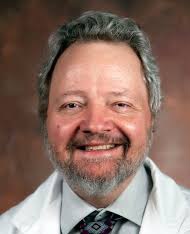Thank you for your interest in our program. We offer a one to two year program in Vascular Neurology. The fellowship is a one year ACGME accredited Vascular Neurology fellowship for all fellows, and may be extended to a two year fellowship with special research focus during the second year. The Medical College of Georgia at Augusta University Medical Center is certified as a Comprehensive Stroke Center, the first in the state of Georgia; the fellowship is ACGME accredited for vascular neurology.
The fellows work one on one with 4 ABPN certified vascular neurologists. During their rotations on the clinical wards, they round with the stroke team, consisting of the attending faculty, neurology residents, nurses, a pharmacist, and rehabilitation therapists. During the course of the year fellows attend weekly didactic sessions covering a wide variety of stroke topics, from anatomy and physiology, pathology, clinical presentations, evaluation, and management.
Fellows actively participate in clinical research (and if interested, may participate in basic science research), helping to identify, enroll, and manage patients in clinical trials; fellows also participate in discussions of trial design, statistical analysis, and management. Fellows are actively involved in the clinical management of patients with stroke. They take part in the acute evaluation and management of patients with stroke, as well as the inpatient assessment and management of non-acute stroke patients. Fellows participate in discussions and presentations on the clinical features, pathophysiology, neuroradiological evaluations, and management of different stroke syndromes. Fellows are expected to be able to discuss evidence based data on acute and long term therapy for stroke. Fellows also see patients in the outpatient stroke clinic under the direct supervision of the stroke faculty.
Applications and supporting materials are accepted only through the Electronic Residency
Application Service (ERAS). Application requirements.
Interviews may be scheduled after receipt of:
Requirements
Applicants must be eligible for a Georgia medical license at the start date of the fellowship. Fellows must have successfully completed a 3 year Neurology residency in a USHME approved residency training program prior to starting the fellowship.
Program Length
The MCG Vascular Neurology Fellowship at Augusta University is a 1 or 2 year training program with the intention of preparing graduates for a clinical and/or academic career.
Inpatient Responsibilities
The vascular neurology fellow rotates on the neurology inpatient service for at least 6 months under the direction of the stroke attending. Responsibilities include daily rounding on all stroke patients and teaching neurology residents and medical students. The fellow sees all new stroke admissions and supervises their acute treatment and diagnostic evaluation. The fellow reviews all of these cases with the stroke attending.
Outpatient Responsibilities
The fellow attends 1 - 2, day clinics per week under the supervision of stroke faculty members.
Teaching Responsibilities
In addition to clinical training, the fellow is responsible for a monthly stroke conference and a stroke journal club. At each stroke conference, the fellow presents a topic chosen by the fellow (typically the topic will be related to a specific case seen on the wards that month). Attendees of the conference are the stroke faculty, other neurology faculty, the neurology residents and medical students. Stroke journal club is held once a month at a stroke faculty member s home. The fellow is responsible for selecting and analyzing an article relevant to their interest.
Didactic Training
Fellows meet for weekly conferences lasting 1-3 hours with the program director for individual instruction in cerebrovascular disease. This includes teaching on stroke epidemiology, clinical manifestations, mechanisms, pathophysiology, and treatment. The fellow is expected to read Dr JP Mohr s textbook (Stroke: pathophysiology, diagnosis, and management), and review the chapters with the program director. Neuroimaging studies are reviewed on a daily to weekly basis with the program director and/or the ward stroke attending.
Call/Telestroke Call
Following a 2 month training period the fellow is integrated into the MCG at Augusta University regional and state telestroke call network. Call will cover over 10 hospitals within the region and state and include evaluation for thrombolysis and other acute therapies. In addition, fellows will be involved in recruiting and enrolling acute stroke study candidates.
Neurosonology Lab
The fellow spends 2 months learning to perform and interpret carotid duplex (CDUS) and transcranial Doppler (TCD) ultrasound. Approximately 140 CDUS and TCD studies are performed each month at MCG, and 140 CDUS are performed at the VA, for evaluation of cerebral ischemia, subarachnoid hemorrhage-related vasospasm and brain death. At the completion of the fellowship, the fellow will have the opportunity to sit for the American Society of Neuroimaging Neurosonology Board Exam.
Academic Training
Fellows will have the opportunity to enroll in the MCG Certificate or Masters program in Clinical and Translational Science at Augusta University. This is a 1-2 year program with advanced training in biostatistics, epidemiology, clinical trial design, grant and scientific writing.
Basic Research
For fellows interested in basic science research, MCG at Augusta University has a diverse and active basic research program in cerebrovascular disease. This includes research programs in neuroprotection, stem cell therapy, hyperglycemia and stroke, hypertension and stroke. Dr Hess, the Chairman of Neurology, is actively involved in basic research as well as clinical research. Fellows may become involved in basic science research, but basic research interest is not required for fellows.
Clinical Research
Fellows participate in ongoing clinical research trials. There are usually both acute stroke intervention trials as well as secondary stroke prevention trials. As part of the participation fellows are involved in trial design, statistical analysis, and trial management.
